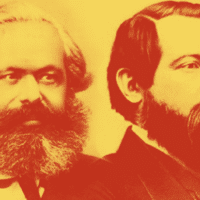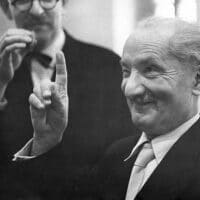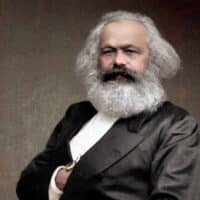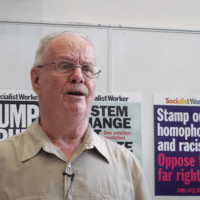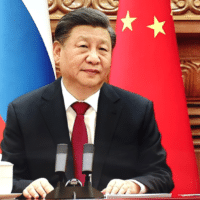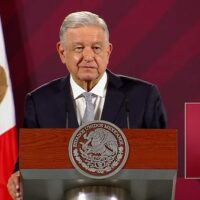-
Nakba at 75
The Nakba, “catastrophe” in Arabic, refers to Israel’s ongoing ethnic cleansing of Palestine, which includes the expulsion and subsequent displacement of Palestinians, the destruction of Palestinian towns and villages, and other attempts to eradicate the Palestinian people from their ancestral homeland in the territory that became the State of Israel.
-
May 8 and the rehabilitation of Nazism in Germany
On 8 and 9 May, Berlin traditionally hosts numerous commemorative events to mark the end of the Second World War in Europe.
-
Michael Lebowitz, presente! (1937–2023)
Marxist economist Michael A Lebowitz passed away at home on April 19.
-
“Karl Marx:” A biography by Engels
Karl Marx was born on May 5, 1818 in Trier, where he received a classical education. He studied jurisprudence at Bonn and later in Berlin, where, however, his preoccupation with philosophy soon turned him away from law.
-
Karl Marx: A Biographical Sketch with an Exposition of Marxism
This article on Karl Marx, which now appears in a separate printing, was written in 1913 (as far as I can remember) for the Granat Encyclopaedia. A fairly detailed bibliography of literature on Marx, mostly foreign, was appended to the article.
-
You’re not deficient, you’re just ruled by assholes
Times are hard, and they’re getting harder, but we can turn this thing around. Please be kind with yourself in the meantime.
-
Remembering Cabral
In the final essay to mark the fiftieth anniversary of national revolutionary leader Amílcar Cabral’s murder in 1973, first published in the ROAPE journal thirty years ago, Basil Davidson provides a personal portrait. Davidson’s piece contains fascinating detail and insight on Cabral’s principles of organising, as well as how Cabral and his comrades started their successful anti-colonial struggle in the early 1950s, all of which retains its relevance in the context of ongoing struggle and revolt across the continent today.
-
Harry Belafonte, the activist who became an artist, dies at 96
Belafonte’s activism changed America, his singing shaped a musical consciousness for generations of Americans, and his acting paved the way for Black performers.
-
Humanitarian activist Harry Belafonte dies at 96
Apart from his humanitarian activism, Belafonte was a longtime critic of the U.S. foreign policy.
-
A critical look at Afrocentrism
Garveyism and Afrocentrism, while different, are grounded in their shared nature of being expressions of a call for National conscience.
-
Heidegger in ruins? Grappling with an anti-semitic philosopher and his troubling rebirth today
The story of German philosopher Martin Heidegger (1889-1976) and his posthumous reception almost reads like the plot of an airport spy thriller.
-
A common misconception about capitalism
THERE is a commonly-held view that while capitalism in its early stages brings about unemployment and hence an accentuation of poverty, this initial damage is subsequently reversed as it keeps growing
-
Post-Political Post-Aesthetics
The universal premises of culture and politics have been subject to criticism from the moment that Enlightenment theories emerged. In postmodern theory, radical skepticism replaces judgement and makes universal speculation seem like either an absurd game or a violent imposition.
-
The Indigenous People, again
It is not strange that the US, Canada, and Australia do not sympathize with the Palestinians because they themselves were settlers too who wiped out whole cultures and confiscated their land.
-
Marx and crisis of the dead tigress
‘Metabolic rift’ Marx’s prophecy at work..
-
The discovery & rediscovery of metabolic rift
Ian Angus discusses the scientific developments that led Marx to develop metabolic rift theory in the 1800s, and a new generation to rediscover it the 21st century.
-
China’s peace plan for Ukraine
It will be attractive to the Global South, writes Tony Kevin. It will cause consternation in the Western war party camp.
-
AMLO says Mexico is more democratic than oligarch-run USA, condemns State Dep’t ‘meddling’ against electoral reform
Responding to State Department criticism of Mexico’s popular electoral reform, President AMLO denounced U.S. “meddling”, support for coups, and the Monroe Doctrine. He said, “There is more democracy today in Mexico than in the United States… because here the people govern, and there the oligarchy govern”.
-
Hugo Chávez didn’t die, he multiplied!
Ten years since his passing, the legacy of Commander Hugo Chávez lives on in the people of Venezuela and the world.
-
How Swiss politicians dismantle Swiss neutrality
The Swiss Confederation—the “Confoederatio Helvetica”, hence the CH on the cars—has been historically neutral since the Congress of Vienna in 1815.


![Police officers ask a man wearing a shirt showing hammer and sickle to close his jacket outside the tomb of the Soviet War memorial at the park in Treptow, during the 78th anniversary of Victory Day and the end of WWII in Europe, in Berlin, Germany, Tuesday, May 9, 2023. [AP Photo/Markus Schreiber]](https://mronline.org/wp-content/uploads/2023/05/0675b615388fd79305802cce06a007eb9a9a66ce-200x200.jpg)

